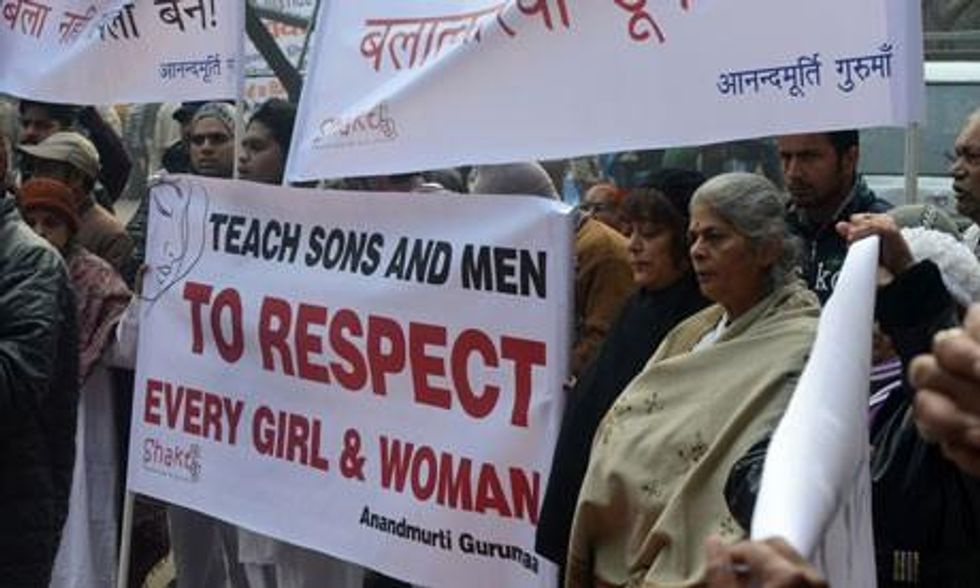There's something uncomfortably neocolonial about the way the Delhi gang-rape and subsequent death of the woman now known as Damini is being handled in the UK and US media. While India's civil and political spheres are alight with protest and demands for changes to the country's culture of sexual violence, commentators here are using the event to simultaneously demonise Indian society, lionise our own, and minimise the enormity of western rape culture.
A particularly blatant example of this is Libby Purves's piece for the Times. She says the Delhi bus rape should "shatter our Bollywood fantasies". For Purves, westerners enjoy a romanticised view of India, all heady spirituality and Marigold Hotels; and especially romantic in their views, for reasons Purves neglects to address, are the British. Thus, upright Europeans have sentimentally ignored the "murderous, hyena-like male contempt" that Purves says is an Indian cultural norm. Neatly excised from her account however is the relationship between poverty, lack of education and repressive attitudes towards women, and, by extension, the role of Europe in creating and sustaining poverty in its former colonies. Attitudes towards women in the east were once used by colonialists to, first, prop up the logic of cultural superiority that justified unequal power relations (the "white man's burden") and second, silence feminists working back in the west by telling them that, comparatively, they had nothing to complain about.
When it finishes calling Indian men hyenas, Purves's article states that westerners "have the luxury of fretting about frillier feminist issues such as magazine images, rude remarks and men not doing housework". Does anyone else see an unattractive historical pattern here?
Her article is not, by any means, the only one to report on this issue as if rape is something that only happens "over there" - something we civilised folk in the west have somehow put behind us. Elsewhere, the message is subtler, but a misplaced sense of cultural superiority shines through. For example, this BBC article states, as if shocking, the statistic that a woman is raped in Delhi every 14 hours. That equates to 625 a year. Yet in England and Wales, which has a population about 3.5 times that of Delhi, we find a figure for recorded rapes of women that is proportionately four times larger: 9,509. Similarly, the Wall Street Journal decries the fact that in India just over a quarter of alleged rapists are convicted; in the US only 24% of alleged rapes even result in an arrest, never mind a conviction. This is the strange kind of reportage you tend to get on the issue.
Owen Jones's excellent piece in the Independent is a breath of fresh air, asking people to acknowledge that rape, as well as gang rapes, happen in the west too. Similarly, Laura Bates's recent article on victim blaming should act as sufficient retort to anyone who thinks police chief KP Raghuvanshi's advice that women should carry chilli powder to prevent rape is symptomatic of a specifically Indian brand of misogyny.
The coverage of Damini's death strikes a particularly ironic note following recent media controversy over a rape, in Steubenville, Ohio, of a 16-year-old girl - allegedly by members of the high-school football team. The case is that the young woman was dragged, drunk and unresponsive, from party to party, where she was sexually abused. The brutal death of Damini has spurred Indian civil society to its feet, causing protest and unrest, bringing women and men into the streets, vocal in their demands for change. Sonia Gandhi has met the woman's parents. The army and the states of Punjab and Haryana have cancelled new year's celebrations. What happened in the US? In Steubenville, football-crazy townsfolk blamed the victim and it took a blogger - Alexandria Goddard, who is now being sued - and a follow-up article from the New York Times four months after the incident to get nationwide attention for the story.
Purves's article claims that we in the west are "looking eastward in disgust". I believe that disgusted parties would do well to turn their judgmental gazes on their own societies. Let's look east in solidarity and support for India's urgently necessary women's rights movement; let's keep talking about the social discrimination Indian women face, which affluent westerners do not. However, it is both prejudiced and completely fantastical to talk as though sexual violence is some kind of Indian preserve. We might have comparatively better women's rights in the UK, but this is due, in large part, to the social services that our wealth allows. Colonial history helped to create and global capital continues to sustain low standards of living in India. We would do well to be cognisant of our historically inscribed privilege before complaining that this horrific event has destroyed our pretty colonial fantasies.


